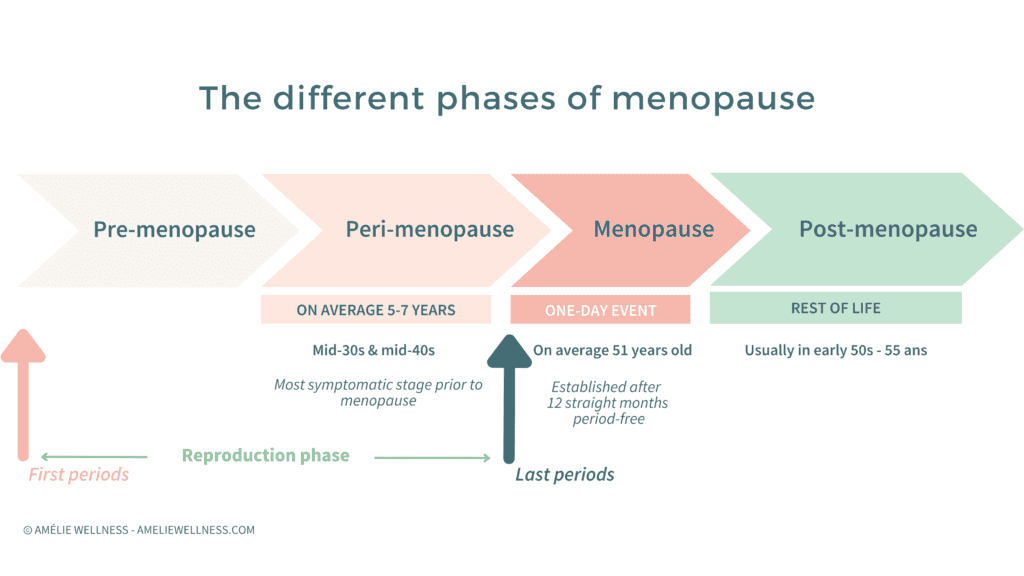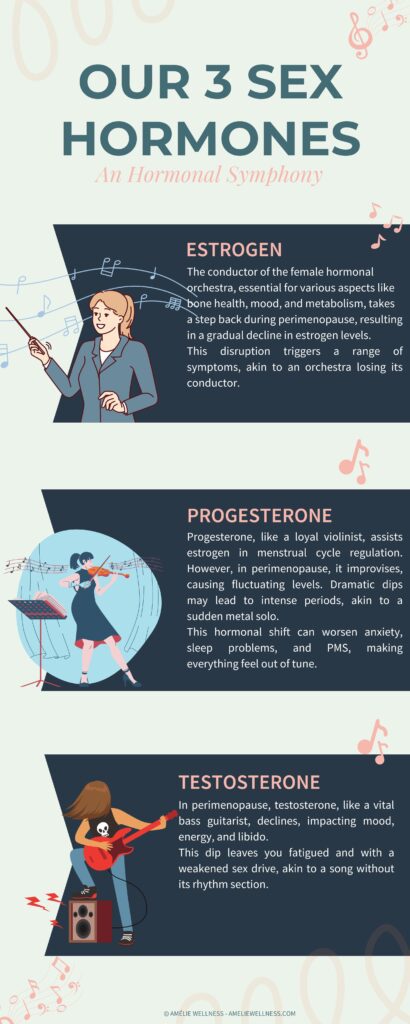
Menopause, often shrouded in mystery, misunderstanding and hushed tones, is a natural transition experienced by all women – marking the end of a woman’s reproductive years.
Hot flushes, mood swings, and whispers of “the change” often paint an incomplete picture of this complex experience that leaves you wondering who you’ve become – these are the early signs of perimenopause, the years leading up to menopause. However, understanding the fundamentals of menopause can empower you to navigate it with confidence and embrace a new chapter of life filled with possibilities.
‘We delight in the beauty of the butterfly but rarely admit the changes it has gone through to achieve that beauty.’ Maya Angelou
01/ Understanding the Word “Menopause”: Unpacking its Meaning
The word “menopause” itself holds a story within its syllables, offering a glimpse into the history of understanding this natural transition. Let’s delve into its origins:
Greek Roots:
- Men(o)-: This part comes from the Greek word “mēn,” meaning “month.” It’s also related to the word “moon,” reflecting the connection to the menstrual cycle and its lunar rhythm.
- -pausis: This part stems from the Greek word “pausis,” which translates to “cessation” or “a breaking off.”
So, literally, “menopause” means “the end of the monthly cycles,” aptly capturing the biological aspect of this phase.
Beyond the Word:
While “menopause” accurately describes the biological process, it doesn’t encompass the full experience of this multifaceted transition. It’s important to remember that it’s not just a “cessation” but also a transformation, a new beginning, and a chance for personal growth. So, next time you hear the word “menopause,” remember the rich history it holds and the journey it represents for women across the globe. It’s a reminder that understanding the past can help us navigate the present and embrace the future with knowledge and empowerment.
02/ Fundamentals of Menopause – the journey unfolds

The different phases of menopause
The journey to menopause unfolds in three distinct phases, each with its unique characteristics:
- Phase 1 – Perimenopause: Menopause doesn’t just happen overnight. There’s a build-up beforehand, that’s what we call Perimenopause.
This prelude begins anywhere from 4 to 10 years before menopause, often in your 40s. According to the UK’s National Health Service (NHS) website, perimenopause occurs between the ages of 45 and 55, with the average age of menopause in the UK being 51. One in 100 women experiences menopause before the age of 40.
Everybody is unique, so these timings can vary.
Think of it as a warm-up act – hormonal fluctuations lead to irregular periods, hot flushes, and mood swings. The star of the show, estrogen, starts its unpredictable dance, sometimes dipping, sometimes spiking, leaving you feeling like you’re riding a hormonal rollercoaster.
- Phase 2 – Menopause: This is the grand finale, marked by the absence of a period for 12 consecutive months, typically around your mid-50s. While some sail through smoothly, others may experience more intense symptoms like hot flashes, vaginal dryness, and sleep disturbances. Remember, this is a temporary phase, and with the right support, you can manage these changes effectively.
- Phase 3 – Postmenopause: The curtain falls on your reproductive years, but the show goes on! This phase, lasting for decades, can be a time of renewed energy and focus on overall well-being. While some symptoms may linger, it’s an opportunity to prioritize healthy habits, manage bone health, and embrace this exciting new chapter in your life.
Understanding Early Menopause and POI
It’s important to differentiate between early menopause and premature ovarian insufficiency (POI):
- Early menopause: Periods stop between ages 40-45, which can occur naturally or due to medical reasons.
- POI: Occurs before age 40 when the ovaries stop functioning normally. While sometimes called “premature menopause,” the earlier age distinguishes it.
Both can involve similar symptoms, but early diagnosis and appropriate care are crucial.
03/ The Hormonal Harmony (or Dissonance)
The roles of Estrogen, Progesterone, and Testosterone
At the heart of menopause lies a symphony of hormones. Understanding the key players and their changing roles is crucial:
- Estrogen: The queen bee, is responsible for regulating your cycle, maintaining vaginal health, and promoting bone density. During perimenopause, its unpredictable fluctuations cause many of the familiar symptoms.
- Progesterone: The loyal supporter, working alongside estrogen to regulate the cycle. Its decline can contribute to heavier periods and mood swings.
- Testosterone: The often-overlooked heroine, influences mood, energy levels, and libido. Its natural decline with age can be accelerated during perimenopause, impacting these crucial aspects of well-being.

04/ Beyond the Hot Flushes
Diverse Symptomatic Landscape
While hot flushes often dominate the conversation surrounding menopause, they represent just one facet of this multifaceted transition experienced by millions of women. Recent research indicates that women might encounter a spectrum of up to 62 different symptoms, highlighting the vast and individualized nature of menopause.
Menopause is not simply a physical phenomenon; it encompasses a spectrum of changes affecting multiple dimensions of well-being. Here’s a closer look at the diverse landscape of symptoms:
- Physical Manifestations: The body adapts to declining estrogen levels through various physical manifestations. Vaginal dryness, sleep disturbances, and changes in weight and metabolism are frequent occurrences. Some women also experience hot flashes, night sweats, and headaches, while others may notice changes in skin and hair texture.
- Emotional Fluctuations: Fluctuating hormones and life transitions often occurring during menopause can impact emotional well-being. Mood swings, anxiety, and even depressive episodes might arise. It’s crucial to remember that these emotional responses are valid and often temporary, requiring self-compassion and support.
- Cognitive Shifts: Some women report experiencing changes in memory, focus, and concentration during menopause. While the exact mechanisms remain under investigation, this cognitive shift can be frustrating and disruptive. Research suggests that maintaining cognitive function through brain-healthy habits like regular exercise and mental stimulation can be beneficial.
Tracking Symptoms
It’s important to remember, that the specific symptoms and their severity vary greatly among individuals. Tracking your menstrual cycles and symptoms can provide valuable information to discuss with your healthcare professional. This open communication empowers them to understand your unique experience and provide personalized guidance, diagnosis, and treatment options tailored to your specific needs.
05/ Empower Your Journey
Remember, you’re not alone in this. By taking charge of your health and well-being, you can navigate menopause with confidence:
- Embrace Healthy Habits: A balanced diet, regular exercise, and good sleep hygiene are your allies. Prioritize activities you enjoy, whether it’s walking in nature, joining a fitness class, or practising mindfulness.
- Seek Support: Talk to your doctor about your concerns and explore treatment options like hormone therapy or complementary therapies. Connect with other women going through similar experiences to share support and advice.
- Focus on Bone Health: Calcium, vitamin D, and weight-bearing exercise are crucial for maintaining strong bones throughout menopause and beyond. Talk to your doctor about personalized recommendations.
- Prioritize Self-Care: Don’t underestimate the power of relaxation techniques like meditation or yoga. Indulge in activities that bring you joy, whether it’s spending time with loved ones, pursuing hobbies, or simply taking a relaxing bath.
Beyond the Finish Line
Menopause is not an ending, but a beautiful transformation. By understanding the key fundamentals and prioritizing your well-being, you can embrace this new chapter with confidence, strength, and a renewed sense of self. Remember, knowledge is power, and with the right information and support, you can navigate your journey through menopause with grace and thrive on the other side
Additional Resources
- Tool: FREE 3 Easy Way To Manage Your Menopause Guide (includes Menopause Symptoms tracker)
- The British Menopause Society – Women’s Health Concern: https://www.womens-health-concern.org/
- The NHS Website – Menopause: https://www.nhs.uk/conditions/menopause/
- The NICE Guidelines: https://www.nice.org.uk/guidance


